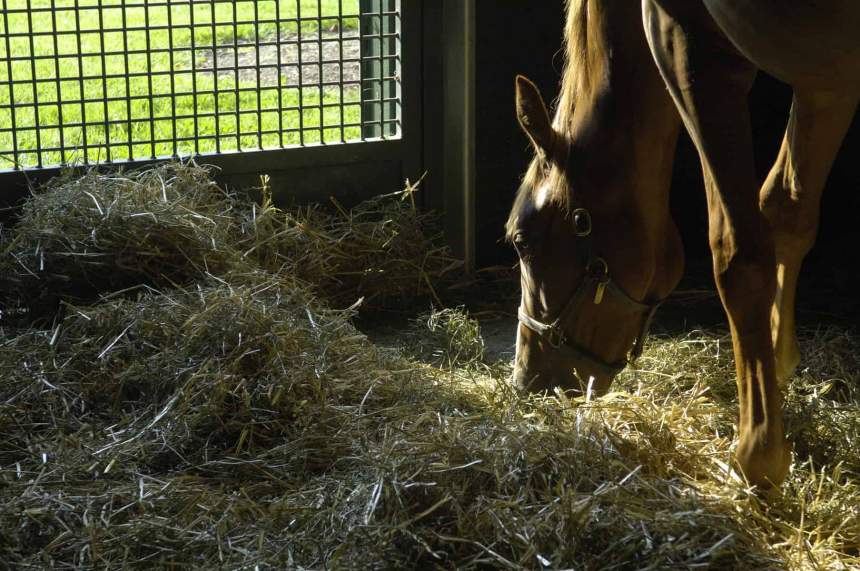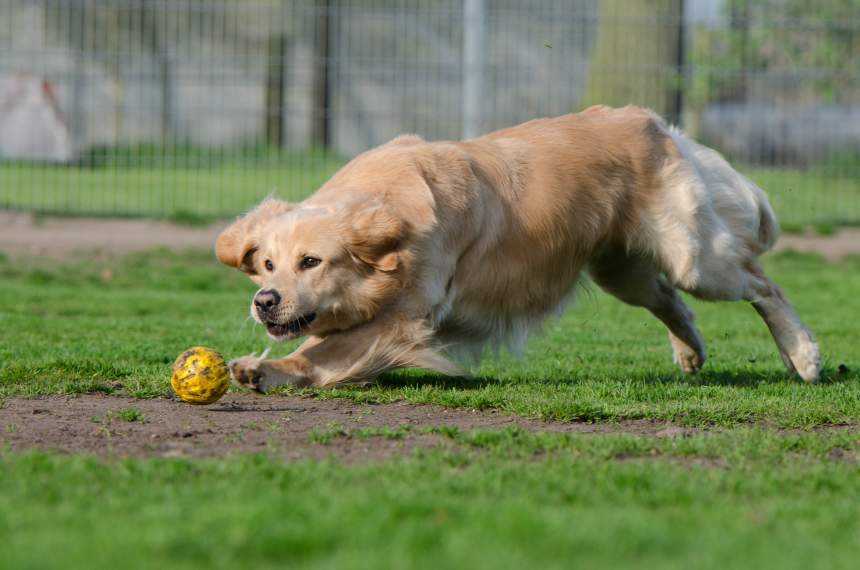Alfalfa is increasingly recommended as a forage and used as a supplement to hay. But it also raises questions about its use in horse feed, in the form of coarsely cut alfalfa hay, it could aggravate their stomach problems.
You May Like: 500 Racehorse and Horse Names
What is alfalfa, and what are the characteristics of this plant? How is it relevant and interesting for equine nutrition? And what are the risks inherent in its use? We take stock and answer all your questions in this article.
What is alfalfa?
Alfalfa, native to Southwest Asia, is a wintery perennial that can grow up to one meter tall. It preferably grows in a hot and dry climate, originally in the Middle East and the Near East, but now also in Spain, France, and as far as Holland and Poland.
Alfalfa: the rediscovery of an ancient legume
It belongs to the legume family and flowers from June to September. This plant is not a recent discovery, far from it. This legume that resembles clover was already used as fodder 2000 years ago.
What are the specificities of alfalfa?
Or in other words, what does this plant contain which excited the Persians in Antiquity? On the one hand, it is characterized by its high proportion of quality proteins, that is to say having a high content of essential amino acids. And on the other hand, it differs from other forages by high calcium content.
You May Know: 6 Most Common Horse Diseases
In addition, alfalfa has several other characteristics: it is rich in crude fiber, low in starch and sugar, and very gentle on the digestive tract. Due to its unique properties, it has been given the nickname “queen of forage plants”.
Alfalfa: a plant of the sainfoin family
Sainfoin is an ancient plant, once used as hay to feed horses and cattle. Its name of “sainfoin” comes from the fact that this plant was considered to be healthy hay.
Sainfoin, therefore, contains essential amino acids, but also calcium, beta-carotene and condensed tannins, which gives it an antiflatulent effect. For horses, it is generally available in pellet form.
How is alfalfa good for horses?
Alfalfa is low in sugar and starch
Compared to hay or concentrated feed (such as cereals or muesli for example), alfalfa contains much less sugar and starch. This implies that its energy content is lower. This makes it an equine feed of choice for horses that are too big or with a predisposition to weight gain (apart from taking into account its high protein content of course).
Read Also: Mare In Heat: Duration, Frequency & Signs
Alfalfa buffers gastric acidity?
Alfalfa hay has been considered for many years to be able to protect against gastric ulcers. Nowadays, this point is very controversial. On the one hand, two international studies from 2007 in the United States and 2013 in New Zealand show that the use of alfalfa has benefits on gastric ulcers.
And on the other hand, a 2016 study from the University of Leipzig shows that a diet of alfalfa hay in foals already with gastric ulcers did not improve but worsened their symptoms. You can read the results of the study conducted by the University of Leipzig in the paragraph on the risks of alfalfa.
High protein intake for the horse
Proteins play a major role in the functioning of the horse’s body. The essential amino acids must be supplied to it through the diet. Indeed, these are involved in many vital processes of the body.
By increasing the intake of amino acids, you promote muscle development, but also milk production in lactating mares. And this allows good development and weight gain in growing foals, over-thin horses and old horses.
Even if it is now recognized that the proteins contained in alfalfa are not involved in triggering laminitis, it should not be forgotten that an overdose puts a strain on the detoxifying metabolism, in particular the intestines, the liver and kidneys. So be particularly vigilant on the quantity supplied to horses suffering from respiratory problems, mud mange.
Alfalfa provides a lot of calcium and little phosphorus for the horse
Depending on where it is harvested, alfalfa can contain up to three (or even five) times more calcium than in hay. This calcium is also particularly assimilated by the body of the horse. However, be aware that too much calcium will act as an antagonist of several other vital nutrients.
So if you feed your horses large amounts of cereals, do not hesitate to supplement their ration with alfalfa to compensate for the high phosphorus content of oats, barley, or corn. Ideally, you should aim for a ratio between Calcium and Phosphorus of between 1 to 3 (that is to say from one to three times more calcium).
We will discuss a little further on the specific reaction between zinc and calcium in alfalfa.
A positive effect on the intestinal flora?
This forage plant could also have a positive influence on the organs deeper in the digestive tract. A German immunology expert from the Life Science Institute believes that alfalfa has a positive effect on the intestinal flora.
Read Also: How Does A Horse Sleep? All You Need To About Horse Sleep
At least as long as the horse does not suffer from the syndrome of the porous intestines (leaky gut), in which “holes” in the intestinal wall prevent the proper assimilation of nutrients. There are no studies to support this observation to this day, but it is an avenue that should be explored in the years to come.
What are the risks associated with alfalfa?
As previously mentioned, scientific studies are currently underway to determine the impact of alfalfa on possible digestive tract problems or irritations.
No improvement in gastric mucosal lesions in foals
A research project was carried out in 2016 by the Faculty of Veterinary Medicine at the University of Leipzig to see if alfalfa helped improve gastric mucosal damage in foals.
Study details
70 half-bred foals at weaning of at least 5 months were divided into three groups receiving a separate diet over a period of 14 days. One group was fed cut alfalfa hay, the second group was fed alfalfa pellets, and the third group was fed alfalfa-free feed.
The results of the study were as follows: No improvement in the lesions of the gastric mucosa was observed, even for foals given alfalfa. In addition, foals given alfalfa hay had more severe mucosal lesions in the pylorus (the area at the exit of the stomach) than those given pellets or a diet without alfalfa.
This means that, contrary to expectations, alfalfa administered in this form worsened rather than improved the symptoms. Whether the results of this study are also valid for adult horses remains to be seen.
Interpretation of the results: in which form to favor alfalfa?
It is estimated that the likelihood of damage to the lining of the stomach is higher when alfalfa is supplied in the form of strands with the ends having sharp edges. Some experts believe that alfalfa sprigs can also irritate the gut, especially if the lining is not completely intact.
It is recommended that you feed your foal with alfalfa pellets instead of alfalfa hay. For example, you can provide it with a feed based on hay (grass) mixed with alfalfa pellets. In the form of granules – which you can also soak – there is no danger in giving alfalfa to your animal, as long as you respect the recommended dose of course.
Alfalfa inhibits the absorption of nutrients by the horse
In large quantities, calcium, but also proteins, can strongly interfere with the absorption of certain trace elements and vitamins (liposoluble in particular). There is still no truly significant study on the impact of alfalfa on nutrients in horse feed.
Nevertheless, it is accepted that zinc loses its properties on contact with foods with high calcium content because it will then form a compound with the bioavailable calcium, contained in large quantities in alfalfa. This reaction makes the zinc unusable by the horse’s body.
Therefore, feeding large amounts of alfalfa to a horse that has mineral feeds or dietary supplements containing zinc in its diet should be avoided.
Nutritional values that vary
The nutritional values of alfalfa are extremely fluctuating, as they strongly depend on the time of harvest, and the method used.
Wrapping is an interesting conversation method; as well as dehydration, which keeps many nutritional virtues of the plant fresh. And when it comes from France, dehydrated alfalfa can replace imported soybean meal!
High content of pyrrolizidine alkaloids
In a study of more than 30 alfalfa hay samples, alkaloids in high concentrations were detected 74% of the time. This does not seem to be due to the alfalfa itself, but to the plants between which it is sown, such as Jacob’s ragwort, water ragwort, colchicum …
Of the horse feed containing alfalfa, 100% of the samples were contaminated with the alkaloid pyrrolizidine, which is poisonous to the liver of horses. This value is worrying compared to the values extracted from the hay samples studied (only 3% of these were contaminated).
Should I use alfalfa in my horse’s diet?
Overall, alfalfa can be categorized as a superfood due to its composition (rich in healthy nutrients). For horses with protein and calcium deficiency, it is a dietary supplement of choice.
No danger at a moderate dose
It should be remembered that any substance taken in large quantities can become poisonous: this also applies to alfalfa. Many horse owners give them alfalfa in small amounts in the form of pellets or hay, wanting to add something tasty to a medicine or mineral feed.
In these cases, there is no need to worry about the results of the German study (which said that there was no improvement in the lesions of the gastric mucosa, and did not conclude anything on the adult horses, let us remember).
Alfalfa contains salicylic acid, which in large quantities can also attack the lining of the stomach.
To avoid the presence of certain pathologies of the horse
We recommend that you be careful with animals suffering from mud mange or eczema: their already strained detoxifying metabolism should not be overloaded with high protein foods. They can therefore only tolerate small amounts of alfalfa.
Likewise, it should be avoided in horses suffering from kidney disease who have difficulty rejecting calcium.
Be careful with foods containing zinc
It is also best to avoid giving alfalfa to horses that are zinc deficient and are given mineralized feeds or dietary supplements containing zinc. Calcium inhibits the absorption of zinc; therefore, do not combine the two.
It is, therefore, preferable to give large quantities of alfalfa in pellet form because of the problem of gastric ulcers (read the paragraph on the impact of alfalfa hay with sharp-edged strands on foals).
Good for growing horses and pregnant or lactating mares
Alfalfa is an interesting concentrated food, especially as a source of protein. When dried, one kilogram of alfalfa contains up to 240 grams of protein, depending on the time of harvest and quality, while oats do not exceed 85 grams.
Due to its high protein content, alfalfa is particularly popular among horse breeders; full or lactating mares as well as young growing horses have an increased need for protein.
The horse’s body also needs more proteins when it changes its coat (production of a new coat). It is then necessary to carefully control the need for amino acids of your animal and not to forget that there are foods that have much higher contents than others.
Choose an organic alfalfa
Be aware that conventional alfalfa is treated with herbicides like glyphosate, bromoxynil … Therefore, choosing organic alfalfa would definitely be wise … Ask about the manufacturer, and choose a grower who attaches l ‘importance to cultivation areas, so that they are dry (without water) and without groundsel (in order to avoid the risk of the presence of toxic alkaloids later).
And for those looking for an alfalfa alternative, you can go with organic oats, hay pellets and green oats, ideally from organic farming.
Conclusion
Scores of horses have been fed alfalfa for decades, and there is no doubt that many owners have been congratulating themselves. But every medal has its flip side, and you have to judge the situation on a case-by-case basis to decide what is best for your horse.








